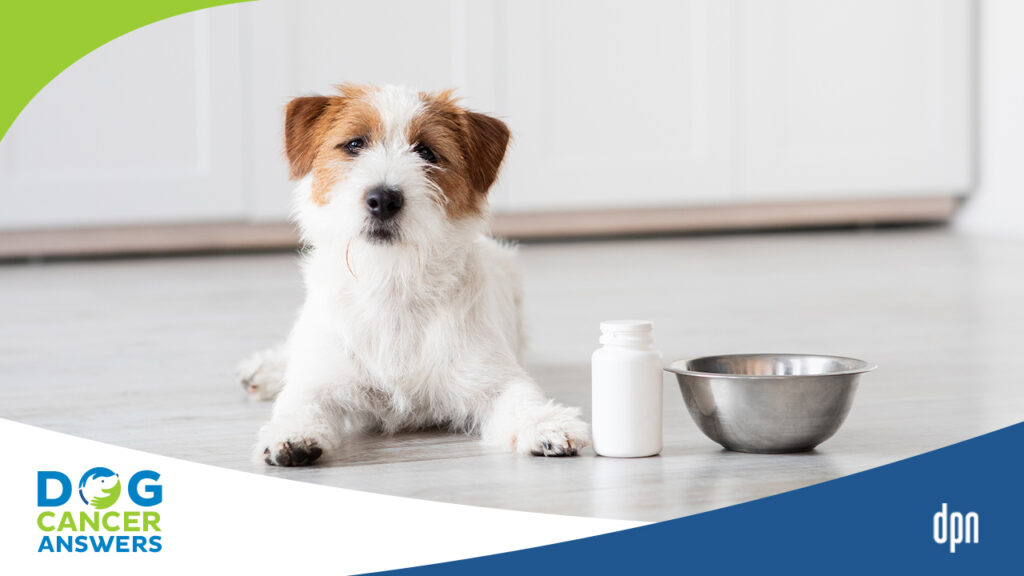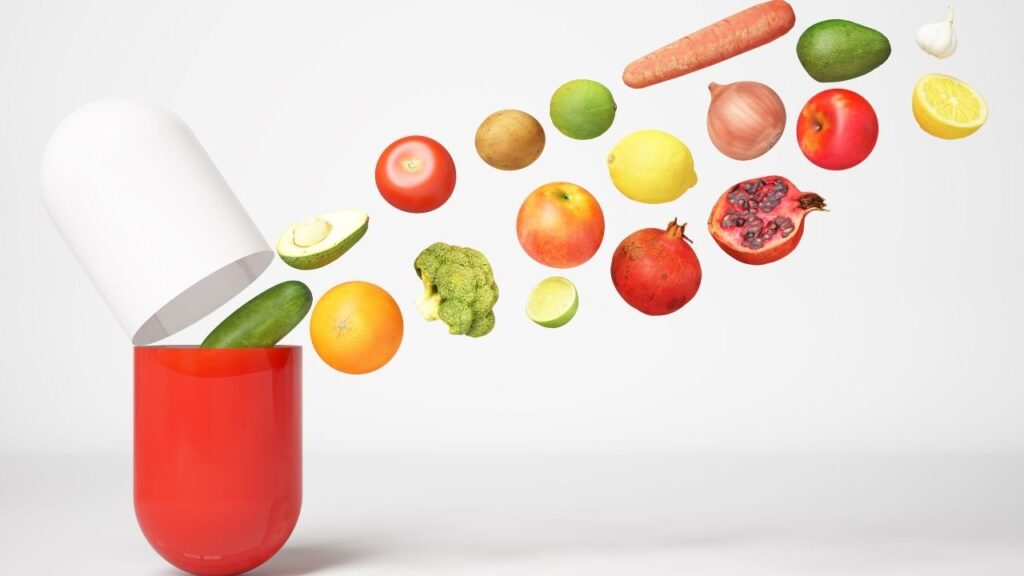Knowledge is key: Do your homework to do no harm and see the amazing benefits supplements have to offer dogs.
Key Takeaways
- Veterinarians recommend supplements for dogs to help prevent issues, help manage body condition, and to extend quality of life.
- Supplements help dogs who need them in many ways. Veterinarians who practice integrative medicine have extra training and/or experience in botanicals and herbal medicines and can help you understand which supplements might support your dog.
- There is no universal best supplement to add to your dog’s food or daily life, because every dog is different. However, if your dog needs extra support, you and your veterinarian might find a gentle, safe supplement to help.
- If your dog is healthy, supplements might support her vigorous health. If she has cancer, you might use supplements to support her body in its fight.
Research and Consult Your Veterinarian
As an integrative veterinarian with extra training in herbal medicine, I routinely recommend supplements for dogs. There are no universal “best supplements for dogs,” but there are things to know as you research and make careful choices with your veterinarian.
What Are Your Goals for Your Dog?
Supplements are beneficial for any dog, no matter if they are for preventive care, or a specific illness.
The goal of supplements can be to help prevent issues, help manage body condition, and maintain a higher quality of life for as long as possible.
What supplement(s) to add depends on if your dog is healthy and you want to support her body or if she has health issues like cancer you need to help fight.
A healthy dog with no issues may only need supportive/preventive supplements like:
- an Omega 3 Fatty Acid supplement
- a joint supplement
- milk thistle
- whole food supplement(s)
- Vitamin D supplementation (but only if Vitamin D levels based on bloodwork are low)
A dog battling cancer will need far more support than a healthy dog.
Dr. Demian Dressler, author of The Dog Cancer Survival Guide, reviews his supplement recommendations on DOG CANCER ANSWERS.
Supplements for Dogs Are Not Straightforward for Your Veterinarian
At the first appointment with a new client, I go through every supplement and medication their dog gets.
I have come to understand that I am often the first veterinarian who is told the whole truth about everything a dog lover is giving their dog. There is a reason that I need to know the whole truth, though: supplements are complex.
Adding supplements to any condition, especially cancer, is not as simple as pharmaceuticals (medications) can be.
Pharmaceuticals have very specific uses, doses, and lots of information about potential side effects from the manufacturer. We also know from our practices how they behave in real dogs.
In a way, we can straightforwardly use pharmaceuticals. If the dog has X, give them Y pharmaceutical in Z dose.
It is not like that with supplements. There is no X=Y scenario.
Choosing Supplements Can Be Overwhelming
There are overwhelming amounts of supplement options to choose from.
- I see the amazing effects of carefully chosen and properly dosed supplements daily.
- I also see dogs on toxic supplements or dangerous combinations of supplements daily.
By far, the most common problem I see is loving dog parents doubling and even tripling up ingredients by using multiple different products. This can cause potentially serious side effects.
This is not to scare you off of using supplements. I have seen results using herbs and supplements that were beyond my expectations allowing dogs to live a healthy life.
It’s just important to think carefully about what you give your dog, how much you give, and when to use it (or stop using it).
The Best Supplements for Dogs with Cancer
Once I have completed a medical history, western medical exam, and eastern medical exam, I formulate a plan. My plan is tailored to each dog, and I pick the most effective supplements and herbs for that dog out of the vast sea of supplements.
Some of the supplements I may use for a dog with cancer may include:
- Omega 3 Fatty acids to help with inflammation, as long as there are no bleeding issues
- Hemp helps with pain, inflammation, and nausea
- Vitamin A and D to help with the immune system (note: these are fat-soluble vitamins, so overdose can happen; you should only give your dogs these supplements under the direction of a veterinarian)
- Vitamin C helps the immune system
- Mushrooms to help with the immune system
- Milk Thistle to help protect the liver
- Chinese and Western herbs
- Whole food supplements to support the body
Is There a Protocol That Works?
The world of supplements can be overwhelming, with tens if not hundreds of supplements that can help with cancer, including supplements not on the list above.
I aim to pick the supplements that will help that specific dog the most, and dose them accordingly.
Each dog will tolerate only so many supplements, so we cannot use every supplement for every dog. There is no set “protocol” I use unfailingly every time.
We have to set priorities based on urgency, budget, and what the dog will tolerate.
It’s also true that not all products and brands are created equal. Before you buy that bottle or dig into that online search, you need to know/understand certain things.
Let’s start with the federal regulation of pharmaceuticals versus the regulation of supplements.
Federal Regulation of Pharmaceuticals
Pharmaceuticals (medications) are single-ingredient chemicals (or a combination of single-ingredient chemicals) made in a factory to treat or cure a medical disease or condition. Examples include antibiotics, blood pressure, cholesterol, and cough medicine. These pharmaceuticals serve the X=Y path I mentioned above.
Medications are:
- heavily regulated in the US by the Food and Drug Administration (FDA)1
- go through scientific studies1
- go through trials to ensure that they are safe and work for their intended purpose before they can be sold for both humans and animals1
The FDA also:
- inspects the factories1
- approves what is on the label1
- ensures the label dosage for the medication is safe1
- side effects of medications are required to be reported, and if there are concerns, the FDA will investigate1
Federal Regulation of Supplements in the U.S.
In contrast, vitamins, supplements, Chinese herbs, Western herbs, etc., in the US:
- are not regulated by the FDA to the same degree as medications because they are in the category of dietary supplement1
- the FDA monitors for any false label claims (like claims to cure cancer)1
- the FDA monitors for reported adverse effects1
- FDA does not require scientific studies before being sold1
Supplement companies are required to meet safety requirements under the Dietary Supplemental Health and Education Act (DSHEA) of 1994. The DSHEA requires supplement companies to comply with the current GMP (Good Manufacturing Practices).
Supplements sold before 1994 were grandfathered in as accepted supplements, but any new supplement ingredient is required to:
- submit forms to the FDA to determine if it is relatively safe before being sold to the public1
- follow label requirements1
- provide dosages on the packaging1
Other Countries Use Different Regulatory Frameworks
Other countries have supplement regulations set up differently. India, Japan, and China have a whole regulatory framework for traditional medicine and supplements, as they are part of their medical management in general.1
In Canada, supplements are regulated by Natural Health Products Regulations and assessed for safety, quality, and efficacy via literature data and research before being imported or sold.1
Australia regulates supplements under the Australian Therapeutic Good Act and are evaluated before they are sold for safety, quality, and efficacy through scientific or evidence-based medicine.1 Australian companies also go through an audit to make sure they are practicing Good Manufacturing Processes.1
Dr. Jessica Tartof, integrative veterinarian, explains her approach to choosing good supplements.
Buyer Beware: Read Supplement Labels
Reading the label is one way to help decide whether to use a product. It can tell us a lot about a product in a small space.
Check for Commercially Grown or Wild Harvested Ingredients
The label may say nothing about where an ingredient comes from, in which case it is likely either commercially grown or “wild harvested,” also known as wildcrafting (hand-picking the herb from its natural or wild ecosystem).
Wild Harvested Ingredients — Are They Better?
There is a common belief that wild-harvested supplements have greater medicinal properties because these plants have to be stronger to survive the natural environmental stressors.
That may not be true, however. Studies have shown that the active ingredients are the same in wild-harvested products verse commercially grown plants and that wildcrafting needs re-evaluation.3
There are also many risks when harvesting wild plants. Risks of wild harvesting are:
- In some places, it is illegal to harvest certain plants wildly because the amount harvested is not regulated, so harvesting causes depletion and risks extinction. For example, wild ginseng and slippery elm are illegal plants to harvest in certain places.
- There is a real risk that whoever is harvesting collects the wrong species, which could cause toxicity, adverse effects, or ineffectiveness of the product.
- Plants in the environment are also subject to contamination through water runoff.
- Depending on the location, secondary pesticide contamination can happen from spraying nearby crops.
- Collecting enough plants to keep up with supply can also be challenging as sourcing ingredients can be seasonal.
- Wild harvesting is also highly affected by droughts, fires, and natural disasters.
Commercially Cultivated Ingredients
Commercially cultivated products allow for a reliable volume of crops as well as a correct identification of species.
There are still risks, of course. The risks of conventional harvesting are:
- The potential use of pesticides that the plant absorbs.
- Even organic farming may not be pesticide-free farming. Organic farmers grow plants without growth stimulants and artificial chemicals, but they can use approved pesticides for organic farming, such as neem, pyrethrin, and lime sulfur.
Check Measurable Amounts
The label will also have any ingredients deemed to be a measurable amount.
If there are high amounts of any herbs, fillers, or flavoring agents, they should be listed.
The herbs and supplements should also have a percentage or ratio listed next to them. For example, “milk thistle seed extract (80% silymarin).”
Any fillers, or “extras” may be listed without percentages.
If your dog has food allergies, especially if it is a chewable supplement, make sure there is nothing listed that your pet is allergic to.
FDA Label Requirements
To help guide consumers, the FDA requires what can and cannot be on a human supplement label. On human supplements, you should easily find:
- A descriptive name of the product
- A statement that it is a dietary supplement
- The name and place of business
- The manufacturer, packer, or distributor
- A list of ingredients
- The set contents of products
- For human supplements, a disclaimer that the FDA has not reviewed it
Watch out for marketing ploys on labels trying to attract your attention with appealing fonts, colors, and designs. Much money goes into figuring out what triggers our brains to pick one product over another.
Red Flags
Certain things are red flags when it comes to supplements. Hype and over-promising is almost always a red flag. Look for the following on labels:
- The phrase “no side effects” is a red flag. Without exception, every supplement could potentially have side effects.
- The “highest strength” is a potential red flag. Higher potency is not always better. Some folks believe “a little bit is good so a lot must be better,” but that is just not true. If a supplement is “potent,” be sure it is formulated by someone who knows what they are doing.
- “Cures X, Y, or Z.” I would love a cure in a bottle, but I haven’t encountered one for any condition or cancer.
- “Quick fix” is a red flag. This is rarely true, especially with supplements, which take longer to work and need time to build up in the body.
- Any other promise that seems too good to be true.
- No list of ingredients because of claims being a “proprietary/secret formula.” (Supplements made to human standards in the U.S. must list ingredients, even if they are proprietary formulas. If someone isn’t including this, they may not be manufacturing safely.)
- Endangered species in the product is a very big red flag. If a manufacturer is willing to break the law and use an endangered species, they are more likely to be willing to break other laws, too.
Green flags
Some things are green flags when it comes to choosing the best supplements. Look for the following:
- The words “cGMP” on the label or the manufacturer’s website. This stands for current Good Manufacturing Processes. It is illegal for cGMP certification to be listed on a label or in their marketing materials if the manufacturer is not following cGMP.
- “Certified Organic” on the label. A product that is Certified Organic is likely to be organic because it is illegal to use this term otherwise. However, if a product claims to be “organic,” it may or may not be organic.
- Third-party certification. A Manufacturer manufacturing to cGMP typically gets third-party certification as part of their regulated inspection process.
- A listing of ingredients and percentages or ratios on the label.
- More information on scientific evidence and studies on their website and supplemental facts.
Pet supplement manufacturing is not regulated under DSHEA, so you might not see everything on these lists. However, you can rely on the list above if a supplement intended for dogs is manufactured to human-grade standards.
Deciding If a Supplement is Right for Your Dog
By following the suggestions above, you may be able to eliminate supplements that have dubious claims or seem suspicious. Once you have determined that the supplement you are considering is worth investigating further, I suggest doing the following:
Read the Ingredients
It is common for supplements to be more of a blend and have more than one herb. Blends can be useful, but there are some things to remember.
If you are giving several different supplements individually, it might be okay, but when you double or triple the same ingredients, it can cause unwanted and even toxic side effects.
For example, fat-soluble vitamins like Vitamin D or A may be included in different blends. These vitamins are already present in the diet, and giving supplements (especially multiple supplements) with these vitamins might cause them to accumulate and create toxicity. Only give supplemental Vitamin A or D if your veterinarian has checked your dog’s levels and thinks they would be helpful.
Another example is licorice, which can have a steroid-like effect and cause problems if excessive amounts are given.
Check the Names of Ingredients
The same ingredient can come from a plant with multiple names, leading to double or triple dosing for your dog.
For example, let’s say I pick Boswellia, to help with some arthritis. Next, I choose Ru Xiang, because the label says it will help with intestinal issues. I’ve just unknowingly bought two supplements with the same ingredient because Ru Xiang is the Chinese name for Boswellia, the western herbal name. (Another name for this herb is the common name, Frankincense.)
Know the Chinese, western, botanical, and common names to avoid doubling up on the same product.
Is It a Whole Plant, or Single Ingredient Supplement?
Plants comprise many different molecules and chemicals, each of which can be a single ingredient in a supplement. Using the whole plant means using more than one active ingredient.
Whether this is a good idea or not is a huge area of debate and could be a whole article itself. To sum up the debate:
- The “single ingredient is best” philosophy is the pharmaceutical industry’s basis: only one ingredient does the job, and the rest is not needed. It’s also easier to control what is in the supplement if a single ingredient is used.
- The belief that “the whole plant is better” is generally the more integrative/holistic philosophy: synergistic interactions between the nonactive and active ingredients make the active ingredient essentially more potent without increasing the dosage and providing additional benefits to the body.
Dosage Recommendations
As tempting as it is, unless directed by a veterinary medical professional, only use the labeled dosage for your dog.
Giving too much can cause gastrointestinal upset and more serious unwanted side effects. More is not better.
If it is a human product, the label dosage is not the same for your pet, as our gastrointestinal tracts are different lengths, and we absorb things at different rates. Check with your veterinarian about dosing for your dog.
Huge Concern: Medication Interactions
Even though they are not pharmaceuticals, supplements still have an effect. Otherwise, why would we use them?
Medication interactions are one of the biggest areas of concern for veterinarians and with good reason.
Drug and supplement interactions can cause a decreased or increased clearance of an herb or medication. This, in turn, causes a decrease or increase in the effect of the medication or supplement. In other words, interactions can lead to potential toxicity or ineffectiveness of the medication or supplement.4
Cytochrome 450 Interactions
Most of these interaction issues are caused by competition at an enzyme called Cytochrome 450. The most common issue with this enzyme is with medications for:
- heart issues5
- blood pressure5
- anti-clotting and clotting5
- anxiety6
- pain medications6
Herbs That Commonly Interact with Medications
Other common interactions occur with certain herbs. The most common herbs that cause contraindications are:
- Dan Shen7
- Gingko4
- Ginseng6
- St. John’s Wort4,6
Antacids
Antacids can cause other medication interactions. Antacids cause a change in the stomach pH level, which can mean herbs are not broken down normally, and thus not absorbed properly, and thus not having the desired effect.
Medications That Speed Up or Slow Down Digestion
Medications that increase or decrease intestinal motility cause increased or decreased transit time, resulting in decreased or increased herbal absorption.
Diseases That May Cause Interactions
Another high-risk category is being treated for any of the following diseases:
- asthma6
- heart issues6
- diabetes6
- epilepsy6
- hypothyroidism6
- hypertension6
- auto-immune6
This high-risk group is partly due to the medications used to treat these conditions, which might cause drug interactions. But it’s also due to the effect of herbs on some of these conditions.
For example, a pet getting insulin for diabetes, then starting a Corn Silk and Gymnema supplement can have their blood sugar drop too low.
Chemotherapy and radiation therapy in combination with supplements and herbs has to be planned individually, depending on what medications, herbs, and therapies are being provided.
Why Oncologists May Discourage the Use of Supplements and Herbs
Generally, veterinary oncologists are concerned with combining supplements, herbs, and oncology due to the lack of formal safety studies.
Most herbs and supplements that may have human safety studies don’t have safety studies on the veterinary side. The evidence-based medicine approach is taken from human medicine.
The general rule of thumb in oncology is to stop supplements and herbs that would be of concern during the week of chemotherapy or radiation. However, this is highly variable and is done in a case-by-case scenario. Some oncologists may even prescribe supplements during chemotherapy treatments. It depends upon their knowledge and experience.
Your integrative/holistic veterinarian or oncologist may not have as many safety qualms because they use supplements regularly and share knowledge with each other. They are very helpful in determining what needs to be done for your pet.
Veterinarians collaborate and rely upon their colleagues for information, guidance, and insight. If you are consulting with a licensed veterinarian about supplement use, they will be able to explain the reasons for their recommendations and address their oncologist colleague’s questions.
Food Interactions
Food and herb interactions are much less likely in animals. Still, certain combinations of food and herbs can result in gastrointestinal upset or acid reflux, especially if they are eating any tomatoes or potatoes.6
Anesthesia
Anesthesia and herb interactions can cause slower clearance of medications, supplements, and anesthesia.6
Let your veterinarian know what supplements you are giving before a procedure to know if any need to be stopped before anesthesia.
If it is an emergency procedure, let your veterinarian know all supplements your dog takes, so they can adjust medications if needed.
My Best Tips for Choosing the Best Dog Supplements
Choosing supplements is not easy. Here are some of my best tips to help you on your supplement journey.
- If your pet has health issues or is on medications, please consult an integrative or holistic veterinarian, to help you navigate which supplement(s) will be the most valuable to your pet. You can look for a provider near you on the American Holistic Veterinary Medical Association (AHVMA) website.
- Keep a list of supplements, medications, and dosages your pet is getting on your phone or a paper list in your wallet/purse for veterinary appointments. Taking a picture of the front of the bottle and the ingredients list is especially helpful if your veterinarian is unfamiliar with it.
- Do your homework so you know the medication(s) your pet is already on, how his supplement(s) work in the body, and if there are known interactions, in humans or animals. What is safe in people is not always safe in animals, but animal-herbal interaction studies are limited, so it’s a good place to start.
- If using a human supplement, watch out for xylitol snuck into human products, which is toxic in dogs. There is a vast array of supplements geared just for pets that can help avoid this issue, as well as provide appropriate dosing.
- Start with one supplement at a time so you know if your pet has any gastrointestinal upset or other issues, you can narrow down what they are not tolerating.
The Supplement Decision Tree
Deciding what supplement to use can be overwhelming, and you do not want to over-supplement your dog.
Here is a good decision tree to use.
What’s the Most Crucial Issue?
Focus on helping with the most crucial issue first. List your dog’s problems and pick the most crucial one.
For example, is your dog not eating because she is nauseous, or is she in so much pain she won’t get up? If she’s not eating because she can’t get up to go to her bowl, addressing her pain might be the first priority. You can address nausea, if necessary, later on.
Does One Supplement Help More Than One Issue?
As you research herbs, you may find one supplement will help more than one issue on your list. If that’s the case, you may be able to address both issues with one supplement, which cuts down on potential interactions and side effects.
Is Your Dog Already on Medications?
If your dog is already on medications, check to see if it is on the high-risk list for interactions. Research how the medication is cleared from the body, and if there are supplement interactions to be aware of.
Is Your Dog Already on Supplements?
If your dog is already on supplements, you will have to check to see if there is doubling up on ingredients.
Start with the Most Helpful Supplement First
Start researching the supplement likely to give your dog the most help right away.
As tempting as it is to “get started on everything,” please don’t start several supplements simultaneously. Everything you put in your dog’s mouth could potentially cause gastrointestinal upset including nausea, vomiting, or diarrhea.
Start with one priority supplement and see that your dog tolerates it well. Then, you can confidently proceed to the next most important supplement and see how your dog tolerates that one in combination with the first one.
Research Companies
Research companies as well as products. Does the company seem to have “real people” working for it? Is it big, small, or mid-size? Testimonials can be made up, so I don’t really pay attention to them. However, calling the company or emailing and seeing if you like the responses you get is a good way to evaluate them.
Go to their website to see if they have an analysis of their product and more information on uses. See if they have been certified by ConsumerLabs, the U.S. Pharmacopeial Convention, or NSF (which used to be called NSF International and before that, the National Sanitation Foundation).
Also, look for cGMP on their website, indicating that they are manufacturing to the highest human standards.
Other Things to Consider
Is there a specific animal product version of a human product? A company that makes supplements for both humans and animals may be more interested in and committed to getting dosing right and safe. Preferably use a product for animals as some human-safe products are toxic to pets.
Watch for fillers or flavoring agents if your pet has allergies.
If possible, use a brand that has been used in a veterinary scientific study which may give more peace of mind for efficacy. To be fair, however, not many of these studies are available, and there are many good supplements that do not have studies specific to their products.
What form is going to be easiest to get into your dog? Supplements are only useful if your dog takes them. Powders, capsules, and chewables may be available; what will work for your dog?
The Bottom Line on Choosing the Best Supplements for Dogs
I have seen the amazing benefits of herbs and supplements daily, where patients live a longer life of good quality. But there is no shortcut to this kind of success. It takes time, patience, and diligence.
Take your time, do your research and digging, and consult with your veterinarian so you can make the best-informed decision for your pet.
Dr. Demian Dressler dives deep into apoptosis and supplements that support it on DOG CANCER ANSWERS.
- Dwyer JT, Coates PM, Smith MJ. Dietary Supplements: Regulatory Challenges and Research Resources. Nutrients. 2018;10(1):41. Published 2018 Jan 4. doi:10.3390/nu10010041 https://sci-hub.se/10.3390/nu10010041
- Charen E, Harbord N. Toxicity of Herbs, Vitamins, and Supplements. Adv Chronic Kidney Dis. 2020;27(1):67-71. doi:10.1053/j.ackd.2019.08.003 https://sci-hub.se/10.1053/j.ackd.2019.08.003
- Assinewe VA, Baum BR, Gagnon D, Arnason JT. Phytochemistry of wild populations of Panax quinquefolius L. (North American ginseng). J Agric Food Chem. 2003;51(16):4549-4553. doi:10.1021/jf030042h https://pubs.acs.org/doi/10.1021/jf030042h
- Rombolà L, Scuteri D, Marilisa S, et al. Pharmacokinetic Interactions between Herbal Medicines and Drugs: Their Mechanisms and Clinical Relevance. Life (Basel). 2020;10(7):106. Published 2020 Jul 4. doi:10.3390/life10070106 https://sci-hub.se/10.3390/life10070106
- Zuo HL, Linghu KG, Wang YL, et al. Interactions of antithrombotic herbal medicines with Western cardiovascular drugs. Pharmacol Res. 2020;159:104963. doi:10.1016/j.phrs.2020.104963 https://www.sciencedirect.com/science/article/abs/pii/S1043661820312718?via%3Dihub
- Hussain MS. Patient counseling about herbal-drug interactions. Afr J Tradit Complement Altern Med. 2011;8(5 Suppl):152-163. doi:10.4314/ajtcam.v8i5S.8 https://www.ncbi.nlm.nih.gov/pmc/articles/PMC3252717/
- Fugh-Berman A. Herb-drug interactions [published correction appears in Lancet 2000 Mar 18;355(9208):1020]. Lancet. 2000;355(9198):134-138. doi:10.1016/S0140-6736(99)06457-0 https://www.thelancet.com/journals/lancet/article/PIIS0140-6736(99)06457-0/fulltext
Topics
Did You Find This Helpful? Share It with Your Pack!
Use the buttons to share what you learned on social media, download a PDF, print this out, or email it to your veterinarian.








